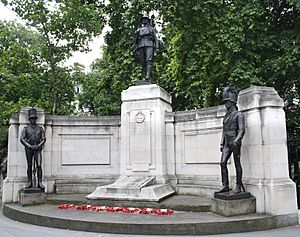Rifle Brigade War Memorial facts for kids

The Rifle Brigade War Memorial in London is a special monument. It remembers the brave soldiers of the Rifle Brigade who fought in the First and Second World Wars. You can find it in the City of Westminster, close to Victoria Station. The land for the memorial was given by the Duke of Westminster.
Contents
What is the Rifle Brigade Memorial?
The Rifle Brigade was a famous part of the British Army. This memorial was built to honor the soldiers who served and gave their lives. It helps us remember their courage and sacrifice during two big world wars.
How the Memorial Was Made
The idea for the memorial came from Colonel Willoughby Verner. The money to build it was raised by a group called the Rifleman's Aid Society. This shows how much people wanted to remember the soldiers.
What the Memorial Looks Like
The memorial is made of light-colored Portland stone. It has a curved wall and a tall central pillar. There are three bronze statues on it, created by a Scottish artist named John Tweed.
- On the tall pillar, there is a statue of a rifleman from the First World War. He wears a helmet and carries his rifle. This statue was modeled after a real soldier, Rifleman Ephraim Alfred Dudley.
- At the bottom, in front of the curved wall, there are two more statues. On the left, you see a rifleman from 1806 with a special Baker rifle.
- On the right, there is an officer with a sword from the year 1800. This was when the Experimental Corps of Riflemen first started.
Remembering the Heroes
The memorial has an important message carved into it. It says that 11,575 men from the Rifle Brigade died in the First World War. Later, another message was added for the 1,329 men who died in the Second World War. All these names are written in a special book called a Roll of Honour. This book is kept at Winchester Cathedral.
The Unveiling Ceremony
The memorial was officially shown to the public on July 25, 1925. Prince Arthur, Duke of Connaught, who was a very important leader of The Rifle Brigade, unveiled it. A religious leader, Reverend Alfred Jarvis, also dedicated the memorial. During the ceremony, soldiers from the 2nd Battalion and many veteran riflemen stood guard to honor their fallen comrades.
A Protected Landmark
In 1970, the memorial was given a special status. It was listed as a Grade II building, which means it is an important historical site. In 2016, its status was upgraded to Grade II*. This means it is considered even more important and needs to be protected.
 | Aurelia Browder |
 | Nannie Helen Burroughs |
 | Michelle Alexander |

